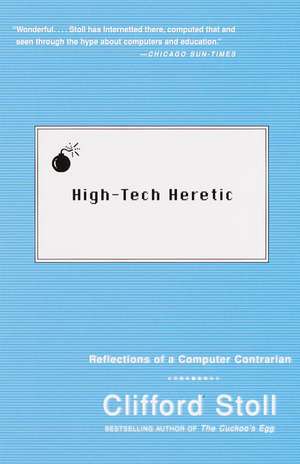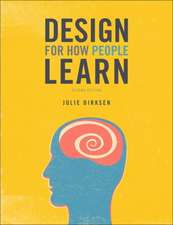High-Tech Heretic: Reflections of a Computer Contrarian
Autor Clifford Stoll Editat de Siobhan Adcocken Limba Engleză Paperback – 31 aug 2000
As one who loves computers as much as he disdains the inflated promises made on their behalf, Stoll offers a commonsense look at how we can make a technological world better suited for people, instead of making people better suited to using machines.
Preț: 102.21 lei
Nou
Puncte Express: 153
Preț estimativ în valută:
19.56€ • 20.47$ • 16.18£
19.56€ • 20.47$ • 16.18£
Carte disponibilă
Livrare economică 17-31 martie
Preluare comenzi: 021 569.72.76
Specificații
ISBN-13: 9780385489768
ISBN-10: 0385489765
Pagini: 240
Dimensiuni: 132 x 203 x 18 mm
Greutate: 0.25 kg
Ediția:Anchor Books.
Editura: Anchor Books
ISBN-10: 0385489765
Pagini: 240
Dimensiuni: 132 x 203 x 18 mm
Greutate: 0.25 kg
Ediția:Anchor Books.
Editura: Anchor Books
Notă biografică
Clifford Stoll, an MSNBC commentator, a lecturer, and a Berkeley astronomer, is the author of the New York Times bestseller The Cuckoo's Egg and Silicon Snake Oil. He lives with his family in the San Francisco Bay area.
Extras
A Literate Luddite?
Am I the only one scratching my head over the relentless invocation of the cliche "computer literacy"? Is a supermarket checkout clerk computer literate because he operates a laser scanner, a digital scale, and a networked point-of-sale computer? Is my sister computer literate because she uses a word processor? Are the mirthless robots at the corner arcade computer literate because they reflexively react to Nintendo droids?
Our nation now spends about three billion dollars a year to wire our classrooms, with an aim of making our country's students computer literate. But how much computing does a high school student need to know?
I'd say a high school graduate, intent on going to college, should be able to use a word processor, manipulate a spreadsheet, know what a database does, be able to use e-mail, and know how to browse the World Wide Web.
But not every high school graduate needs to be able to program spreadsheets or lay out databases. It's a waste of time to teach competency on specific programs . . . software taught in high school probably won't be used elsewhere, or will soon be outdated. Instead, we should teach what a database does and where it's useful, so that if that student winds up running a warehouse or keeping an address book, she'll know to turn to a database program.
So, how long did it take you to learn a word processor? A day? Maybe three? Aside from the mechanical typing lessons, this just isn't challenging stuff.
To cover what I've outlined is hardly difficult--perhaps a few weeks on a computer. Unworthy of much time or academic attention. Learning how to use a computer--as opposed to programming a computer--is essentially a mechanical task, one that doesn't require or encourage creativity.
Of course, using a computer requires learning to type. Oops, I mean acquiring keyboarding proficiency. Again, hardly rocket science.
Computer literacy doesn't demand the same level of instruction as English, American history, or physics. It doesn't require the same amount of effort, either. Spending semesters teaching computing simply subtracts time from other subjects.
Probably because computers are so easy for students to learn, educators love to teach computer techniques. But what are their students prepared for? A lifetime of poking at a keyboard for eight hours a day. It's one more way to dumb down the school, giving the appearance of teaching futuristic subjects while dodging truly challenging topics.
Today, practically all office workers know word processing. Most learned it late in life, well past age eighteen. But some subjects, while easy for a child to learn, are impossible for adults . . . languages, for instance. The earlier you start, the easier to become fluent. Same with playing a musical instrument. Or drawing. Or public speaking. Gymnastics. Plenty of people wish they'd learned a musical instrument or a foreign language as a child. But I've never heard anyone complain that they were deprived because they weren't exposed enough to computers or television as a kid.
Which gives you more advantages in business: having a long history of computer experiences, going back to programming Logo? Or fluency in Japanese, German, French, and Chinese? Which is more likely to lead to a rich, happy life: a childhood of Nintendo and Playstations, or one of hikes and bikes?
When I point out the dubious value of computers in schools, I hear the point "Look, computers are everywhere, so we have to bring them into the classroom."
Well, automobiles are everywhere too. They play a damned important part in our society and it's hard to get a job if you can't drive. Cars account for more of our economy than do computers: General Motors' revenues are many times those of Microsoft.
But we don't teach automobile literacy. Nor do we make driver's education a central part of the curriculum--indeed, many schools are now dropping driver's ed, recognizing that teenagers can learn to drive without intensive schooling.
Sure, cars and computers play a prominent role in our lives. Hey--soft-drink ads dominate our skylines and our globe's awash in a syrupy, brown sugar solution, yet we don't push Coca-Cola into elementary schools. At least, we didn't until educators invited Channel-1 and the advertising-laden Internet into classrooms.
But since computers seem ubiquitous, don't we have to bring them to school? Well, no. Television, which is certainly omnipresent, has been relegated to a fairly minor role in education, and politicians aren't funding new initiatives to buy more classroom TV sets.
Want a nation of dolts? Just center the curriculum on technology--teach with videos, computers, and multimedia systems. Aim for highest possible scores on standardized tests. Push aside such less vocationally applicable subjects as music, art, and history. Dolts are what we'll get.
Mathematician Neal Koblitz recognizes the anti-intellectual appeal of computers: "They're used in the classroom in a way that fosters a golly-gee-whiz attitude that sees science as a magical black box, rather than as an area of critical thinking. Instead of asking whether or not technology can support the curriculum, educators try to find ways to squeeze the curriculum into a mold so that computers and calculators can be used."
Computers encourage students to turn in visually exciting hypermedia projects, often at the expense of written compositions and hand-drawn projects. Pasting a fancy graphic into a science report doesn't mean an eighth grader has learned anything. Nor does a downloaded report from the Internet suggest that a student has any understanding of the material.
Yet the emphasis on professional reports sends students the message that appearance and fonts mean more than content. Kids stuck with pencils feel somehow inferior and out of place next to those with computer-generated compositions. The computer-enabled students spend more time preening their reports, rather than understanding the subject matter.
At a high school science fair, I saw a multicolor map of the Earth, showing global temperature distributions. I asked the report's author why the Amazon rain forest seemed so cold--the map showed the jungle to be thirty-eight degrees. "I don't know," he shrugged. "I found the map from the Internet." The guy never considered that the data might be in Celsius, rather than Fahrenheit.
Am I the only one scratching my head over the relentless invocation of the cliche "computer literacy"? Is a supermarket checkout clerk computer literate because he operates a laser scanner, a digital scale, and a networked point-of-sale computer? Is my sister computer literate because she uses a word processor? Are the mirthless robots at the corner arcade computer literate because they reflexively react to Nintendo droids?
Our nation now spends about three billion dollars a year to wire our classrooms, with an aim of making our country's students computer literate. But how much computing does a high school student need to know?
I'd say a high school graduate, intent on going to college, should be able to use a word processor, manipulate a spreadsheet, know what a database does, be able to use e-mail, and know how to browse the World Wide Web.
But not every high school graduate needs to be able to program spreadsheets or lay out databases. It's a waste of time to teach competency on specific programs . . . software taught in high school probably won't be used elsewhere, or will soon be outdated. Instead, we should teach what a database does and where it's useful, so that if that student winds up running a warehouse or keeping an address book, she'll know to turn to a database program.
So, how long did it take you to learn a word processor? A day? Maybe three? Aside from the mechanical typing lessons, this just isn't challenging stuff.
To cover what I've outlined is hardly difficult--perhaps a few weeks on a computer. Unworthy of much time or academic attention. Learning how to use a computer--as opposed to programming a computer--is essentially a mechanical task, one that doesn't require or encourage creativity.
Of course, using a computer requires learning to type. Oops, I mean acquiring keyboarding proficiency. Again, hardly rocket science.
Computer literacy doesn't demand the same level of instruction as English, American history, or physics. It doesn't require the same amount of effort, either. Spending semesters teaching computing simply subtracts time from other subjects.
Probably because computers are so easy for students to learn, educators love to teach computer techniques. But what are their students prepared for? A lifetime of poking at a keyboard for eight hours a day. It's one more way to dumb down the school, giving the appearance of teaching futuristic subjects while dodging truly challenging topics.
Today, practically all office workers know word processing. Most learned it late in life, well past age eighteen. But some subjects, while easy for a child to learn, are impossible for adults . . . languages, for instance. The earlier you start, the easier to become fluent. Same with playing a musical instrument. Or drawing. Or public speaking. Gymnastics. Plenty of people wish they'd learned a musical instrument or a foreign language as a child. But I've never heard anyone complain that they were deprived because they weren't exposed enough to computers or television as a kid.
Which gives you more advantages in business: having a long history of computer experiences, going back to programming Logo? Or fluency in Japanese, German, French, and Chinese? Which is more likely to lead to a rich, happy life: a childhood of Nintendo and Playstations, or one of hikes and bikes?
When I point out the dubious value of computers in schools, I hear the point "Look, computers are everywhere, so we have to bring them into the classroom."
Well, automobiles are everywhere too. They play a damned important part in our society and it's hard to get a job if you can't drive. Cars account for more of our economy than do computers: General Motors' revenues are many times those of Microsoft.
But we don't teach automobile literacy. Nor do we make driver's education a central part of the curriculum--indeed, many schools are now dropping driver's ed, recognizing that teenagers can learn to drive without intensive schooling.
Sure, cars and computers play a prominent role in our lives. Hey--soft-drink ads dominate our skylines and our globe's awash in a syrupy, brown sugar solution, yet we don't push Coca-Cola into elementary schools. At least, we didn't until educators invited Channel-1 and the advertising-laden Internet into classrooms.
But since computers seem ubiquitous, don't we have to bring them to school? Well, no. Television, which is certainly omnipresent, has been relegated to a fairly minor role in education, and politicians aren't funding new initiatives to buy more classroom TV sets.
Want a nation of dolts? Just center the curriculum on technology--teach with videos, computers, and multimedia systems. Aim for highest possible scores on standardized tests. Push aside such less vocationally applicable subjects as music, art, and history. Dolts are what we'll get.
Mathematician Neal Koblitz recognizes the anti-intellectual appeal of computers: "They're used in the classroom in a way that fosters a golly-gee-whiz attitude that sees science as a magical black box, rather than as an area of critical thinking. Instead of asking whether or not technology can support the curriculum, educators try to find ways to squeeze the curriculum into a mold so that computers and calculators can be used."
Computers encourage students to turn in visually exciting hypermedia projects, often at the expense of written compositions and hand-drawn projects. Pasting a fancy graphic into a science report doesn't mean an eighth grader has learned anything. Nor does a downloaded report from the Internet suggest that a student has any understanding of the material.
Yet the emphasis on professional reports sends students the message that appearance and fonts mean more than content. Kids stuck with pencils feel somehow inferior and out of place next to those with computer-generated compositions. The computer-enabled students spend more time preening their reports, rather than understanding the subject matter.
At a high school science fair, I saw a multicolor map of the Earth, showing global temperature distributions. I asked the report's author why the Amazon rain forest seemed so cold--the map showed the jungle to be thirty-eight degrees. "I don't know," he shrugged. "I found the map from the Internet." The guy never considered that the data might be in Celsius, rather than Fahrenheit.
Recenzii
"An often funny and acerbic look at the new computer priesthood." --The Christian Science Monitor
"Stoll's long experience with technology gives him authority. . . . His claims are based on facts, logic and common sense." --The Seattle Times
"Wonderful. . . . Stoll has Internetted there, computed that and seen through the hype about computers and education." --Chicago Sun-Times
"When Stoll says something, gearheads and non-gearheads alike usually listen. Not only is he an entertaining writer, but he is completely sensible in his approach about the role computers should play in our lives." --The San Diego Union-Tribune
"Wonderful...SHould be in the hands of every school administrator ready to sign a check for more computers."-Chicago Sun-Times
"Stoll's long experience with technology gives him authority. . . . His claims are based on facts, logic and common sense." --The Seattle Times
"Wonderful. . . . Stoll has Internetted there, computed that and seen through the hype about computers and education." --Chicago Sun-Times
"When Stoll says something, gearheads and non-gearheads alike usually listen. Not only is he an entertaining writer, but he is completely sensible in his approach about the role computers should play in our lives." --The San Diego Union-Tribune
"Wonderful...SHould be in the hands of every school administrator ready to sign a check for more computers."-Chicago Sun-Times
Descriere
Stoll examines the cry for and against computers in the classroom, and offers a pointed critique of the hype surrounding computers and their benefits in education.











